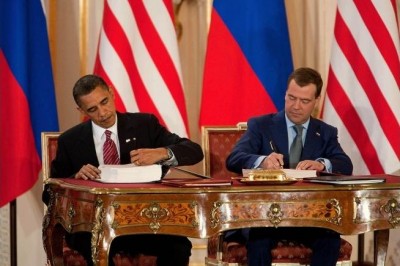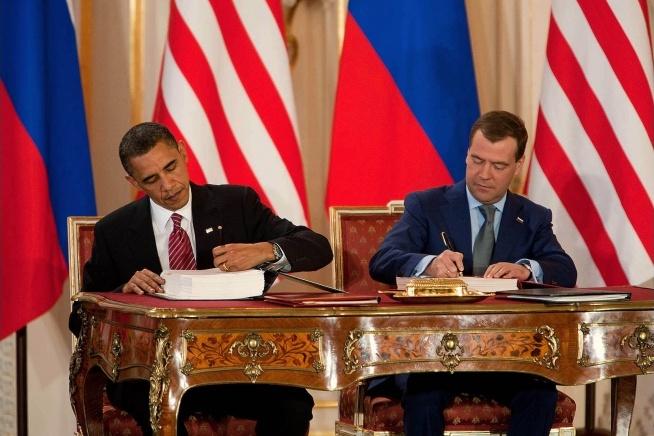 Getting two-thirds of the Senate to agree on anything is a daunting task. So it was no small feat when the Senate approved New START, the Strategic Arms Reduction Treaty, during its December lame duck session. New START was the first major international agreement passed by the Senate since the Chemical Weapons Convention (CWC) in 1997.
Getting two-thirds of the Senate to agree on anything is a daunting task. So it was no small feat when the Senate approved New START, the Strategic Arms Reduction Treaty, during its December lame duck session. New START was the first major international agreement passed by the Senate since the Chemical Weapons Convention (CWC) in 1997.
The United States is a bit schizophrenic when it comes to treaties. The U.S. government does a great job negotiating them. From the International Criminal Court to the Comprehensive Test Ban Treaty, U.S. diplomats have forged very constructive compromises on major human rights and security agreements. Unfortunately, the U.S. Senate has a history of letting these accords molder. The Senate and the White House still have a long list of treaties that are overdue for ratification.
Much can be learned from the successful passage of this treaty. Here are seven lessons for policymakers to consider as they move forward.
Seven Lessons
The Senate can ratify a treaty: New START proved that the Senate can overcome its own inertia and support U.S. participation in international agreements. Only 37 current Senators were in office in 1997 when the CWC was ratified. The Senate’s leadership and its newer members now know that two-thirds of them can agree when it comes to important matters of national security.
The president and White House staff must be engaged: Treaty ratification is a team sport. It inevitably involves Senate leadership, the State Department, other key agencies and civil society. But unless the president and his or her staff are committed to ratification, it will never happen. New START was one of President Obama’s priorities from day one. Early in the process, President Obama chose Vice President Biden to manage the ratification process. Biden and his staff talked regularly with the Senate, corralled statements from opinion leaders, and met regularly with the NGO coalition members. Any future ratification efforts will need the president’s personal support, a designated high-level White House manager and effective staff to succeed.
Bipartisan political cover with appropriate validation can overcome insane messaging: In the lead-up to the New START vote, 16 former secretaries of state, secretaries of defense and national security advisors from both Republican and Democratic administrations publically supported ratification. The Joint Chiefs of Staff and a heavy brigade of current and former high level military and national security officials did as well. On Capitol Hill, the bipartisan leadership of Senators Kerry and Lugar set the tone for the debates. The weight of these supporters and the clear bipartisan backing allowed lawmakers to overcome opponents negative and inaccurate messaging about New START. In addition, it created the political space needed for enough Republican Senators to vote yes against the wishes of Minority Leader Mitch McConnell and Minority Whip Jon Kyl.
You got to have a good ground game: Although substantive concerns regarding treaties can be addressed inside the Beltway, constituents most often contact their representatives in response to messages they hear and read. In the case of New START, it was outlandish criticisms manufactured by those opposed to all things multilateral. Such propaganda efforts must be counter-balanced in their home states by in-state supporters. This allows senators to make decisions based on substance rather than political lobbying. During the New START campaign, coalition members engaged field organizers and local organizations who successfully generated constituent buy-in. Particularly effective was identifying key individuals who had the ear of their senators.
Leadership must be willing to gamble: Treaty ratification is not easy. Opponents usually score more political points with their base than supporters do with theirs. (The reactions of those motivated by fear are usually more intense than those based on cooperation and reason.) The White House, Senate leadership, and the chair of the Senate Foreign Relations Committee are reluctant to schedule floor time for treaties unless they know have secured the 67 votes needed for passage. But the vast majority of Senators will wait until the vote is scheduled before they weigh in because of the political heat opponents can muster from constituents. The decision of Senator Reid and the White House to move New START to the floor, even though they were not completely sure of the outcome, was necessary and courageous. Likewise, the final votes on any major treaty are a gamble and must be approached that way.
No single senator controls the debate: The White House and Senate leadership did an excellent job of clearing the many hurdles placed in front of New START ratification. One concern worth noting is that perhaps they gave Senator Jon Kyl, the Republican Whip, a larger seat at the table than he deserved. Kyl had substantive concerns about modernization of U.S. nuclear weapons stockpiles. These were appropriately addressed. But Kyl seemed to always have a new objection or concern, which the White House responded to in turn. It soon became clear to most observers that regardless of what the White House said or did, Kyl would oppose ratification. Even after an additional $5 billion was secured for modernization, he continued to object. His successful negotiation with the White House ended up giving him a stronger position to oppose ratification. Ratification could have been achieved earlier and at a lower cost by recognizing this that the White House was never going to appease Kyl.
It’s about national security and global leadership: Nations do not sign treaties for altruistic reasons. They must enhance U.S. national security, the U.S. ability to establish global policy that supports our values, or both. New START messaging addressed both. It identified nuclear warhead reduction and verification as a national security interest. It also portrayed New START as improving U.S credibility to lead future disarmament and nonproliferation efforts.
The Treaty Queue
Treaties are the bedrock of international law. U.S. accession to a convention increases its credibility while bolstering U.S. global leadership. It’s long past time for the Senate to take up incredibly important agreements that have languished for decades, such as the Convention on the Law of the Sea, the Comprehensive Nuclear Test Ban Treaty and The Convention on the Elimination of All Forms of Discrimination against Women (CEDAW). New treaties, like the Convention on the Rights of Persons with Disabilities that the administration signed this summer, will soon be added to the list.
Challenges to the U.S. vision of a world based on democracy and human rights are coming from emerging economies and fundamentalist regimes. Renewed U.S. reinforcement of the web of international laws and norms is our best means of parrying such attacks.
This is not a Democratic or a Republican priority –it’s a national priority. New START ratification proves that the U.S. Senate still can get the “advise and consent” job done. A concrete next step is ratification of at least one more treaty during the next six months, so that the lessons sink in.
